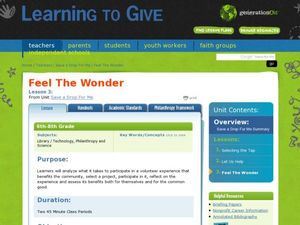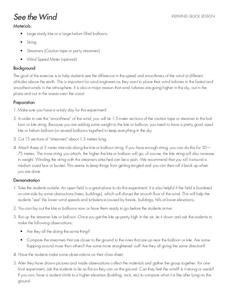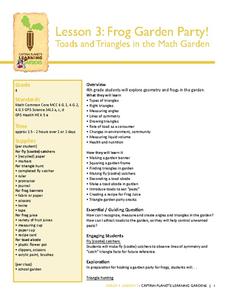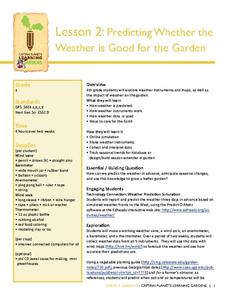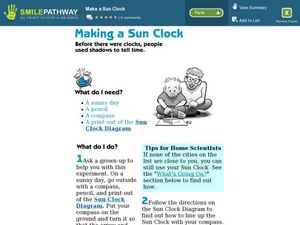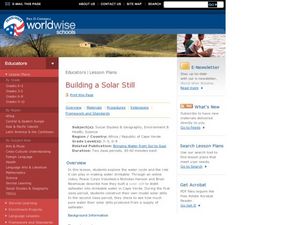Curated OER
Earth, Sun and Moon
Students investigate that the sun is at the center of the solar system through role play. One student is the sun and one student is the Earth. The students then show how the Earth orbits around the sun. Students view a flashlight and...
Curated OER
The Starry Night Time and Day Time
Second graders complete a unit of lessons on the solar system. They complete various art projects inspired by Van Gogh's 'Starry Night,' create a moon phases book, create a moon phase wind chime, develop a timeline of space exploration,...
Curated OER
Water Resources and the Role of the Independent Sector
Young scholars identify the need to maintain and protect our natural resources. In this natural resource lesson, students study pictures of the effects of pollution on animals and water. Young scholars brainstorm a list of ways water is...
Curated OER
Save a Drop for Me
Students discuss the meaning of philanthropy and how it applies to people caring about the water supply. In this water conservation lesson, students explore possible water conservation activities and select a project. Students will...
Curated OER
ABCs of Endangered Species
Students create an ABC Book of Endangered Animals that includes locator maps, "fast facts," and explanations about why those animals are endangered.
Curated OER
Doin' The Moonwalk
If you are looking for an outstanding lesson on the Moon for your budding astronomers, look no further! This outstanding plan is full of wonderful, meaningful activities for your charges to engage in. Pupils will discover why there are...
Curated OER
Fossil Fuels (Part II), The Geology of Oil
More of a mini-unit than a lesson, these activities lead inquisitors through a survey of oil deposits. In the first part, they read about and view diagrams of sedimentary rock layers that trap oil. Next, they test porosity and...
Astronomical Society of the Pacific
Getting Ready for the All American Eclipse!
Give your pupils a front row seat at the biggest light show in the sky this year! In addition to admiring the total solar eclipse, young astronomers can explain the phenomenon with a little help from an inquiry-based lesson. The focus of...
Curated OER
Seein' Double, Seein' Double
By using the Internet, hands-on activities, video, and cooperative learning, pupils look into the conditions in which light casts shadows on objects. The lesson plan includes fabulous hands-on activities, art projects, worksheets, and...
Curated OER
Taking the Measure of the Universe
Four fabulous activities immerse amateur astronomers into measuring objects that we cannot handle. The experiences are applied to NASA's Space Interferometry Mission, which will take measurements of planets around stars other than our...
Captain Planet Foundation
Worm Your Way Out of This
How can you provide healthy soil for your garden? Study worms, bacteria, and other microorganisms in a lesson about decomposition and organic compost. After discussing what you know about worms and watching a video, watch what worms do...
Curated OER
An Environmental Puzzle: The Carbon Cycle
Middle school science stars examine fuels and energy with a variety of activities. They begin with a KWL chart, read an informative passage, and then complete a puzzle. The puzzle itself is included. Cleverly, each piece corresponds to a...
Curated OER
See The Wind!
Students learn about wind at different altitudes above the earth. In this wind lesson plan, students use kites or balloons with attached streamers to observe the wind speed, wind turbulence and shear at different elevations. Students...
Captain Planet Foundation
Frog Garden Party! Toads and Triangles in the Math Garden
It's frog party time! With frog banners, frog juice, and a triangle hunt, your garden party is sure to be both entertaining and educational. The instructional activity connects geometry, earth science, and delicious snacks to teach kids...
Curated OER
Planets in our Solar System
A wonderfully designed, and very thorough lesson plan on the planets in our solar system. Designed for third graders, this lesson plan has learners use technology and multimedia tools to research, explore, and create information about...
American Chemical Society
Condensation
It's time to break the ice! If you are doing all of the lessons in the unit, children have already seen that increasing heat increases the rate of evaporation, but is the opposite true? Does decreasing temperature cause more condensation...
Captain Planet Foundation
Which Plant Is Which?
Learn about dichotomous keys, plant identification, and how to care for the planet with a lesson that includes several hands-on and innovative activities. Kids go on a plant scavenger hunt and classify the plants that they find...
Captain Planet Foundation
Predicting Whether the Weather is Good for the Garden
Can your class predict the weather? Show them how they can come close with a lesson about creating weather instruments, including weather vanes, barometers, wind socks, anemometers, and thermometers. Kids research weather patterns and...
Curated OER
What is Air?
Students investigate air by participating in a class experiment. For this matter measurement lesson, students identify air as a gas which consists of mass. Students utilize a windsock or balloon to measure oxygen and explore it's true...
University of Colorado
Space Travel Guide
Neptune takes 164.8 Earth years to travel around the sun. In the fifth of 22 lessons, young scientists create a travel guide to a planet in our solar system. They provide tips for others on what to bring, what they see, and their...
Curated OER
Making a Sun Clock
In this clock construction lesson plan, students use a pencil, compass, and sun clock diagram to construct a homemade sun clock. A very interesting lesson plan on combining images with text.
Curated OER
Building A Solar Still
Students investigate the water cycle by viewing an online video. In this drinking water lesson, students create solar stills at their campus in order to purify water that is tainted. Students view a video on their computers...
Virginia Department of Education
The Hydrologic Cycle
There is the same amount of water on earth now as there was when it was formed. The water from your faucet could contain molecules that dinosaurs drank! Young scientists build their own hydrologic cycle model and observe...
Baylor College
We Need Water
There's nothing quite like a glass of ice-cold, freshly squeezed lemonade. Lesson seven of this series explains how the water humans need to survive can come in many forms. Teach your class about how much water humans require every day...





